Business Strategy Report: International Olympic Committee Strategy
VerifiedAdded on 2023/06/03
|10
|3399
|464
Report
AI Summary
This report delves into the realm of business strategy, focusing on the International Olympic Committee (IOC). It examines the core concepts of functional strategy, including financial, human resource, marketing, and research and development strategies, and their importance in achieving organizational goals, especially in the context of the Olympic Games. The report emphasizes the necessity for effective planning and resource allocation, along with the importance of risk management, as exemplified by challenges like the Zika virus. It explores the benefits of functional strategies, such as operational clarity, specialization advantages, and customer satisfaction. Furthermore, the report identifies management strategies to implement and evaluate the functional plan, offering insights into financial planning, human resource management, marketing techniques, and research and development initiatives. It also addresses potential challenges the IOC might face, such as inadequate funding and lack of cooperation, and suggests mitigation strategies. Finally, the report discusses how the knowledge gained in strategic planning is useful in career development, emphasizing skills in analysis, evaluation, and decision-making.
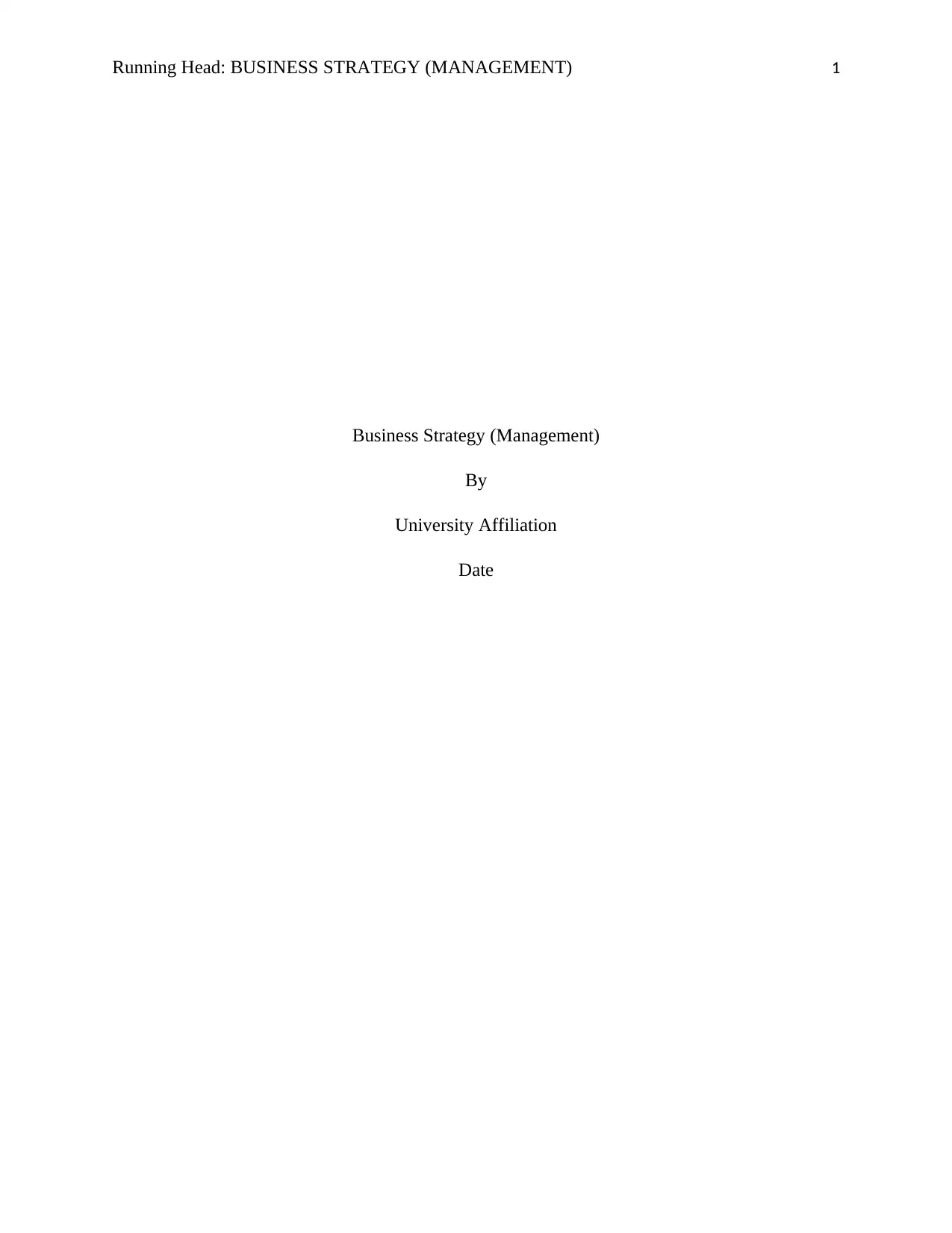
Running Head: BUSINESS STRATEGY (MANAGEMENT) 1
Business Strategy (Management)
By
University Affiliation
Date
Business Strategy (Management)
By
University Affiliation
Date
Paraphrase This Document
Need a fresh take? Get an instant paraphrase of this document with our AI Paraphraser
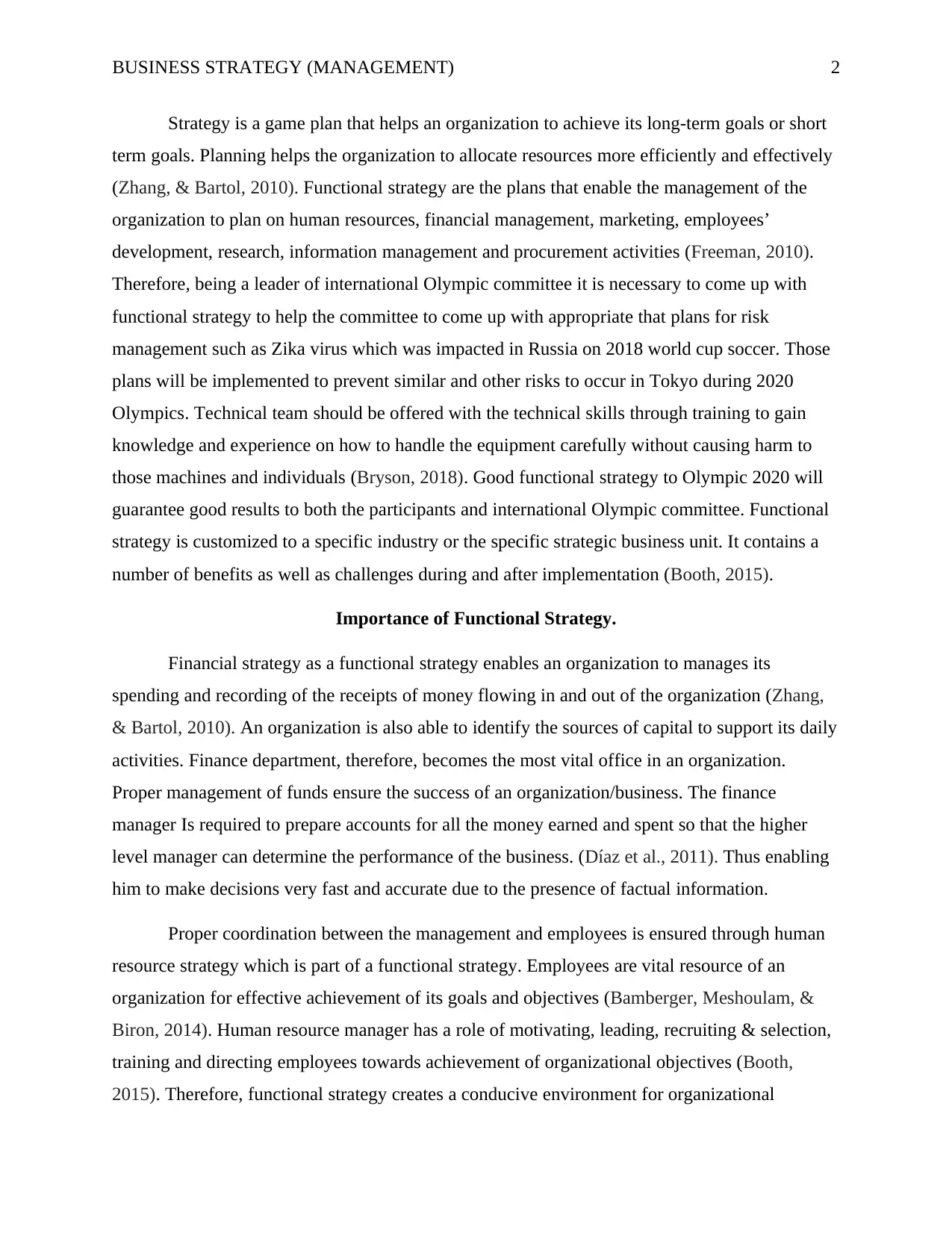
BUSINESS STRATEGY (MANAGEMENT) 2
Strategy is a game plan that helps an organization to achieve its long-term goals or short
term goals. Planning helps the organization to allocate resources more efficiently and effectively
(Zhang, & Bartol, 2010). Functional strategy are the plans that enable the management of the
organization to plan on human resources, financial management, marketing, employees’
development, research, information management and procurement activities (Freeman, 2010).
Therefore, being a leader of international Olympic committee it is necessary to come up with
functional strategy to help the committee to come up with appropriate that plans for risk
management such as Zika virus which was impacted in Russia on 2018 world cup soccer. Those
plans will be implemented to prevent similar and other risks to occur in Tokyo during 2020
Olympics. Technical team should be offered with the technical skills through training to gain
knowledge and experience on how to handle the equipment carefully without causing harm to
those machines and individuals (Bryson, 2018). Good functional strategy to Olympic 2020 will
guarantee good results to both the participants and international Olympic committee. Functional
strategy is customized to a specific industry or the specific strategic business unit. It contains a
number of benefits as well as challenges during and after implementation (Booth, 2015).
Importance of Functional Strategy.
Financial strategy as a functional strategy enables an organization to manages its
spending and recording of the receipts of money flowing in and out of the organization (Zhang,
& Bartol, 2010). An organization is also able to identify the sources of capital to support its daily
activities. Finance department, therefore, becomes the most vital office in an organization.
Proper management of funds ensure the success of an organization/business. The finance
manager Is required to prepare accounts for all the money earned and spent so that the higher
level manager can determine the performance of the business. (Díaz et al., 2011). Thus enabling
him to make decisions very fast and accurate due to the presence of factual information.
Proper coordination between the management and employees is ensured through human
resource strategy which is part of a functional strategy. Employees are vital resource of an
organization for effective achievement of its goals and objectives (Bamberger, Meshoulam, &
Biron, 2014). Human resource manager has a role of motivating, leading, recruiting & selection,
training and directing employees towards achievement of organizational objectives (Booth,
2015). Therefore, functional strategy creates a conducive environment for organizational
Strategy is a game plan that helps an organization to achieve its long-term goals or short
term goals. Planning helps the organization to allocate resources more efficiently and effectively
(Zhang, & Bartol, 2010). Functional strategy are the plans that enable the management of the
organization to plan on human resources, financial management, marketing, employees’
development, research, information management and procurement activities (Freeman, 2010).
Therefore, being a leader of international Olympic committee it is necessary to come up with
functional strategy to help the committee to come up with appropriate that plans for risk
management such as Zika virus which was impacted in Russia on 2018 world cup soccer. Those
plans will be implemented to prevent similar and other risks to occur in Tokyo during 2020
Olympics. Technical team should be offered with the technical skills through training to gain
knowledge and experience on how to handle the equipment carefully without causing harm to
those machines and individuals (Bryson, 2018). Good functional strategy to Olympic 2020 will
guarantee good results to both the participants and international Olympic committee. Functional
strategy is customized to a specific industry or the specific strategic business unit. It contains a
number of benefits as well as challenges during and after implementation (Booth, 2015).
Importance of Functional Strategy.
Financial strategy as a functional strategy enables an organization to manages its
spending and recording of the receipts of money flowing in and out of the organization (Zhang,
& Bartol, 2010). An organization is also able to identify the sources of capital to support its daily
activities. Finance department, therefore, becomes the most vital office in an organization.
Proper management of funds ensure the success of an organization/business. The finance
manager Is required to prepare accounts for all the money earned and spent so that the higher
level manager can determine the performance of the business. (Díaz et al., 2011). Thus enabling
him to make decisions very fast and accurate due to the presence of factual information.
Proper coordination between the management and employees is ensured through human
resource strategy which is part of a functional strategy. Employees are vital resource of an
organization for effective achievement of its goals and objectives (Bamberger, Meshoulam, &
Biron, 2014). Human resource manager has a role of motivating, leading, recruiting & selection,
training and directing employees towards achievement of organizational objectives (Booth,
2015). Therefore, functional strategy creates a conducive environment for organizational
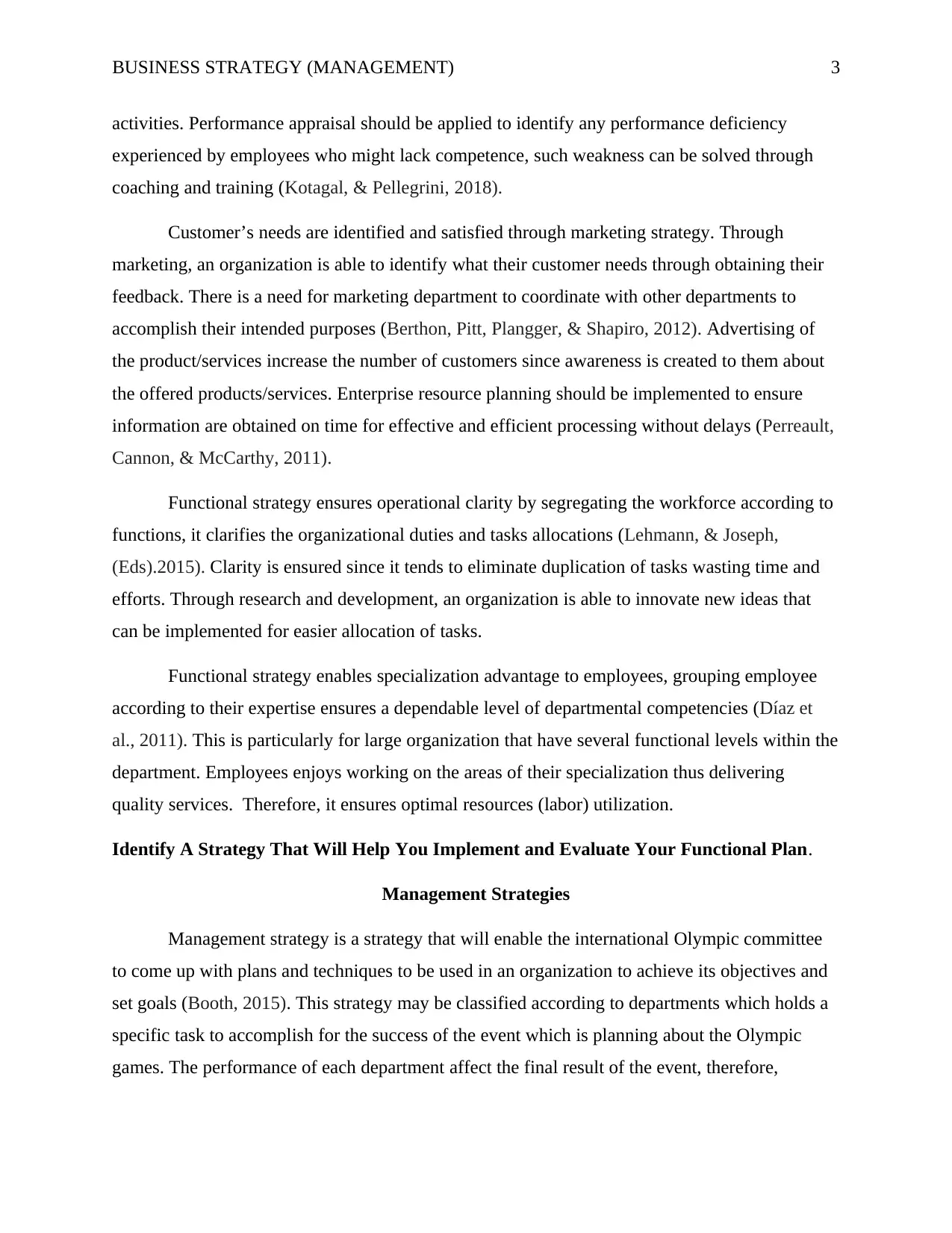
BUSINESS STRATEGY (MANAGEMENT) 3
activities. Performance appraisal should be applied to identify any performance deficiency
experienced by employees who might lack competence, such weakness can be solved through
coaching and training (Kotagal, & Pellegrini, 2018).
Customer’s needs are identified and satisfied through marketing strategy. Through
marketing, an organization is able to identify what their customer needs through obtaining their
feedback. There is a need for marketing department to coordinate with other departments to
accomplish their intended purposes (Berthon, Pitt, Plangger, & Shapiro, 2012). Advertising of
the product/services increase the number of customers since awareness is created to them about
the offered products/services. Enterprise resource planning should be implemented to ensure
information are obtained on time for effective and efficient processing without delays (Perreault,
Cannon, & McCarthy, 2011).
Functional strategy ensures operational clarity by segregating the workforce according to
functions, it clarifies the organizational duties and tasks allocations (Lehmann, & Joseph,
(Eds).2015). Clarity is ensured since it tends to eliminate duplication of tasks wasting time and
efforts. Through research and development, an organization is able to innovate new ideas that
can be implemented for easier allocation of tasks.
Functional strategy enables specialization advantage to employees, grouping employee
according to their expertise ensures a dependable level of departmental competencies (Díaz et
al., 2011). This is particularly for large organization that have several functional levels within the
department. Employees enjoys working on the areas of their specialization thus delivering
quality services. Therefore, it ensures optimal resources (labor) utilization.
Identify A Strategy That Will Help You Implement and Evaluate Your Functional Plan.
Management Strategies
Management strategy is a strategy that will enable the international Olympic committee
to come up with plans and techniques to be used in an organization to achieve its objectives and
set goals (Booth, 2015). This strategy may be classified according to departments which holds a
specific task to accomplish for the success of the event which is planning about the Olympic
games. The performance of each department affect the final result of the event, therefore,
activities. Performance appraisal should be applied to identify any performance deficiency
experienced by employees who might lack competence, such weakness can be solved through
coaching and training (Kotagal, & Pellegrini, 2018).
Customer’s needs are identified and satisfied through marketing strategy. Through
marketing, an organization is able to identify what their customer needs through obtaining their
feedback. There is a need for marketing department to coordinate with other departments to
accomplish their intended purposes (Berthon, Pitt, Plangger, & Shapiro, 2012). Advertising of
the product/services increase the number of customers since awareness is created to them about
the offered products/services. Enterprise resource planning should be implemented to ensure
information are obtained on time for effective and efficient processing without delays (Perreault,
Cannon, & McCarthy, 2011).
Functional strategy ensures operational clarity by segregating the workforce according to
functions, it clarifies the organizational duties and tasks allocations (Lehmann, & Joseph,
(Eds).2015). Clarity is ensured since it tends to eliminate duplication of tasks wasting time and
efforts. Through research and development, an organization is able to innovate new ideas that
can be implemented for easier allocation of tasks.
Functional strategy enables specialization advantage to employees, grouping employee
according to their expertise ensures a dependable level of departmental competencies (Díaz et
al., 2011). This is particularly for large organization that have several functional levels within the
department. Employees enjoys working on the areas of their specialization thus delivering
quality services. Therefore, it ensures optimal resources (labor) utilization.
Identify A Strategy That Will Help You Implement and Evaluate Your Functional Plan.
Management Strategies
Management strategy is a strategy that will enable the international Olympic committee
to come up with plans and techniques to be used in an organization to achieve its objectives and
set goals (Booth, 2015). This strategy may be classified according to departments which holds a
specific task to accomplish for the success of the event which is planning about the Olympic
games. The performance of each department affect the final result of the event, therefore,
⊘ This is a preview!⊘
Do you want full access?
Subscribe today to unlock all pages.

Trusted by 1+ million students worldwide
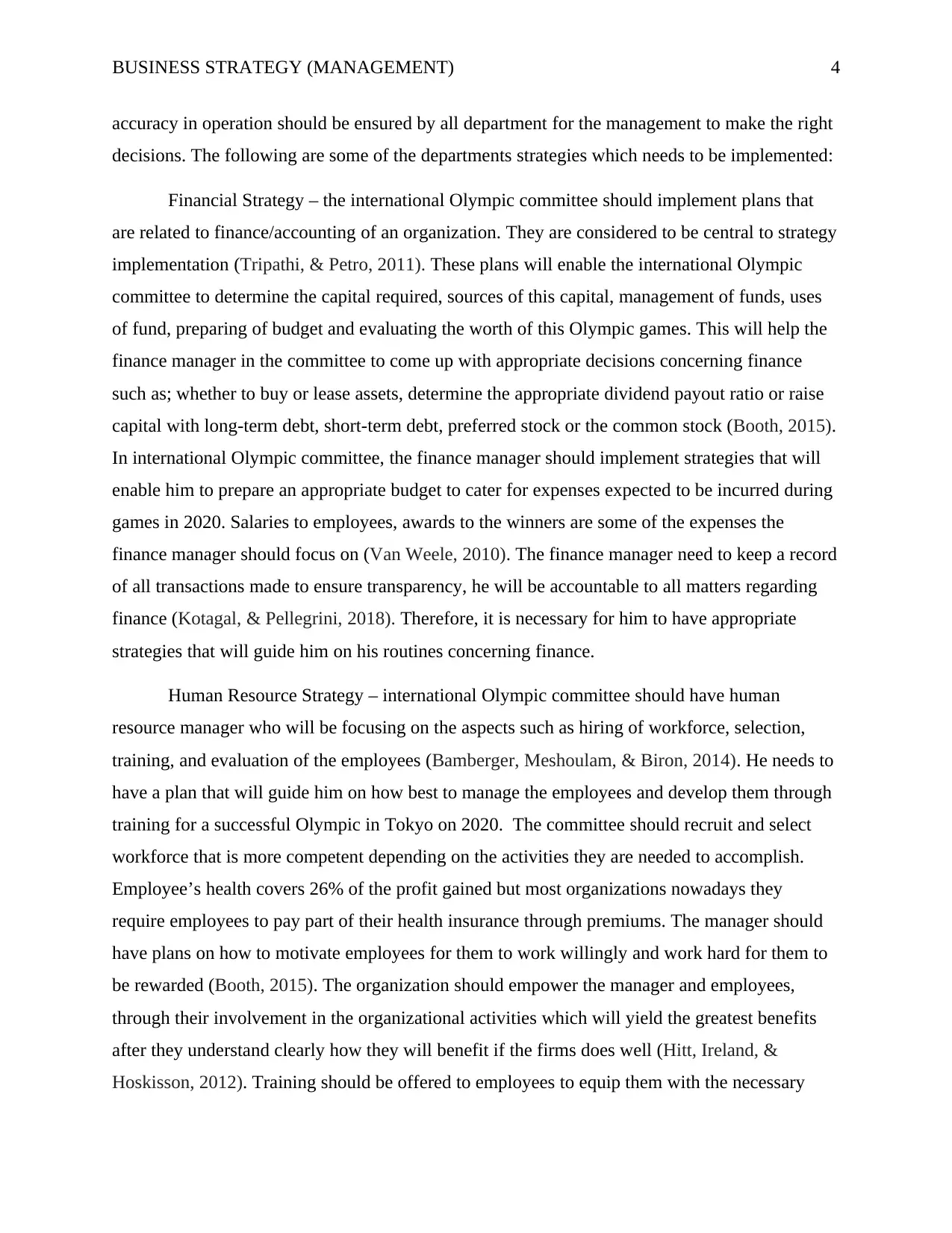
BUSINESS STRATEGY (MANAGEMENT) 4
accuracy in operation should be ensured by all department for the management to make the right
decisions. The following are some of the departments strategies which needs to be implemented:
Financial Strategy – the international Olympic committee should implement plans that
are related to finance/accounting of an organization. They are considered to be central to strategy
implementation (Tripathi, & Petro, 2011). These plans will enable the international Olympic
committee to determine the capital required, sources of this capital, management of funds, uses
of fund, preparing of budget and evaluating the worth of this Olympic games. This will help the
finance manager in the committee to come up with appropriate decisions concerning finance
such as; whether to buy or lease assets, determine the appropriate dividend payout ratio or raise
capital with long-term debt, short-term debt, preferred stock or the common stock (Booth, 2015).
In international Olympic committee, the finance manager should implement strategies that will
enable him to prepare an appropriate budget to cater for expenses expected to be incurred during
games in 2020. Salaries to employees, awards to the winners are some of the expenses the
finance manager should focus on (Van Weele, 2010). The finance manager need to keep a record
of all transactions made to ensure transparency, he will be accountable to all matters regarding
finance (Kotagal, & Pellegrini, 2018). Therefore, it is necessary for him to have appropriate
strategies that will guide him on his routines concerning finance.
Human Resource Strategy – international Olympic committee should have human
resource manager who will be focusing on the aspects such as hiring of workforce, selection,
training, and evaluation of the employees (Bamberger, Meshoulam, & Biron, 2014). He needs to
have a plan that will guide him on how best to manage the employees and develop them through
training for a successful Olympic in Tokyo on 2020. The committee should recruit and select
workforce that is more competent depending on the activities they are needed to accomplish.
Employee’s health covers 26% of the profit gained but most organizations nowadays they
require employees to pay part of their health insurance through premiums. The manager should
have plans on how to motivate employees for them to work willingly and work hard for them to
be rewarded (Booth, 2015). The organization should empower the manager and employees,
through their involvement in the organizational activities which will yield the greatest benefits
after they understand clearly how they will benefit if the firms does well (Hitt, Ireland, &
Hoskisson, 2012). Training should be offered to employees to equip them with the necessary
accuracy in operation should be ensured by all department for the management to make the right
decisions. The following are some of the departments strategies which needs to be implemented:
Financial Strategy – the international Olympic committee should implement plans that
are related to finance/accounting of an organization. They are considered to be central to strategy
implementation (Tripathi, & Petro, 2011). These plans will enable the international Olympic
committee to determine the capital required, sources of this capital, management of funds, uses
of fund, preparing of budget and evaluating the worth of this Olympic games. This will help the
finance manager in the committee to come up with appropriate decisions concerning finance
such as; whether to buy or lease assets, determine the appropriate dividend payout ratio or raise
capital with long-term debt, short-term debt, preferred stock or the common stock (Booth, 2015).
In international Olympic committee, the finance manager should implement strategies that will
enable him to prepare an appropriate budget to cater for expenses expected to be incurred during
games in 2020. Salaries to employees, awards to the winners are some of the expenses the
finance manager should focus on (Van Weele, 2010). The finance manager need to keep a record
of all transactions made to ensure transparency, he will be accountable to all matters regarding
finance (Kotagal, & Pellegrini, 2018). Therefore, it is necessary for him to have appropriate
strategies that will guide him on his routines concerning finance.
Human Resource Strategy – international Olympic committee should have human
resource manager who will be focusing on the aspects such as hiring of workforce, selection,
training, and evaluation of the employees (Bamberger, Meshoulam, & Biron, 2014). He needs to
have a plan that will guide him on how best to manage the employees and develop them through
training for a successful Olympic in Tokyo on 2020. The committee should recruit and select
workforce that is more competent depending on the activities they are needed to accomplish.
Employee’s health covers 26% of the profit gained but most organizations nowadays they
require employees to pay part of their health insurance through premiums. The manager should
have plans on how to motivate employees for them to work willingly and work hard for them to
be rewarded (Booth, 2015). The organization should empower the manager and employees,
through their involvement in the organizational activities which will yield the greatest benefits
after they understand clearly how they will benefit if the firms does well (Hitt, Ireland, &
Hoskisson, 2012). Training should be offered to employees to equip them with the necessary
Paraphrase This Document
Need a fresh take? Get an instant paraphrase of this document with our AI Paraphraser
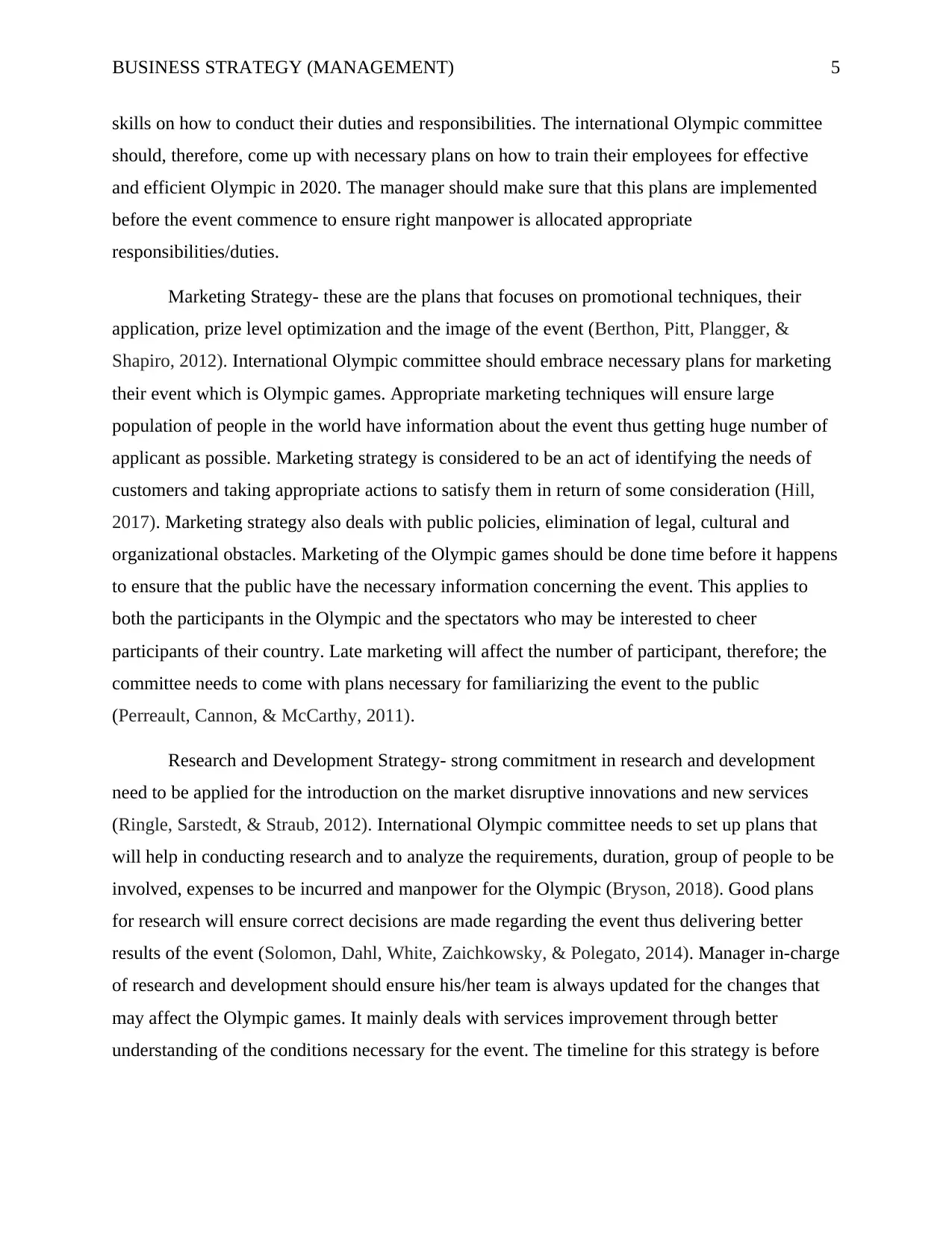
BUSINESS STRATEGY (MANAGEMENT) 5
skills on how to conduct their duties and responsibilities. The international Olympic committee
should, therefore, come up with necessary plans on how to train their employees for effective
and efficient Olympic in 2020. The manager should make sure that this plans are implemented
before the event commence to ensure right manpower is allocated appropriate
responsibilities/duties.
Marketing Strategy- these are the plans that focuses on promotional techniques, their
application, prize level optimization and the image of the event (Berthon, Pitt, Plangger, &
Shapiro, 2012). International Olympic committee should embrace necessary plans for marketing
their event which is Olympic games. Appropriate marketing techniques will ensure large
population of people in the world have information about the event thus getting huge number of
applicant as possible. Marketing strategy is considered to be an act of identifying the needs of
customers and taking appropriate actions to satisfy them in return of some consideration (Hill,
2017). Marketing strategy also deals with public policies, elimination of legal, cultural and
organizational obstacles. Marketing of the Olympic games should be done time before it happens
to ensure that the public have the necessary information concerning the event. This applies to
both the participants in the Olympic and the spectators who may be interested to cheer
participants of their country. Late marketing will affect the number of participant, therefore; the
committee needs to come with plans necessary for familiarizing the event to the public
(Perreault, Cannon, & McCarthy, 2011).
Research and Development Strategy- strong commitment in research and development
need to be applied for the introduction on the market disruptive innovations and new services
(Ringle, Sarstedt, & Straub, 2012). International Olympic committee needs to set up plans that
will help in conducting research and to analyze the requirements, duration, group of people to be
involved, expenses to be incurred and manpower for the Olympic (Bryson, 2018). Good plans
for research will ensure correct decisions are made regarding the event thus delivering better
results of the event (Solomon, Dahl, White, Zaichkowsky, & Polegato, 2014). Manager in-charge
of research and development should ensure his/her team is always updated for the changes that
may affect the Olympic games. It mainly deals with services improvement through better
understanding of the conditions necessary for the event. The timeline for this strategy is before
skills on how to conduct their duties and responsibilities. The international Olympic committee
should, therefore, come up with necessary plans on how to train their employees for effective
and efficient Olympic in 2020. The manager should make sure that this plans are implemented
before the event commence to ensure right manpower is allocated appropriate
responsibilities/duties.
Marketing Strategy- these are the plans that focuses on promotional techniques, their
application, prize level optimization and the image of the event (Berthon, Pitt, Plangger, &
Shapiro, 2012). International Olympic committee should embrace necessary plans for marketing
their event which is Olympic games. Appropriate marketing techniques will ensure large
population of people in the world have information about the event thus getting huge number of
applicant as possible. Marketing strategy is considered to be an act of identifying the needs of
customers and taking appropriate actions to satisfy them in return of some consideration (Hill,
2017). Marketing strategy also deals with public policies, elimination of legal, cultural and
organizational obstacles. Marketing of the Olympic games should be done time before it happens
to ensure that the public have the necessary information concerning the event. This applies to
both the participants in the Olympic and the spectators who may be interested to cheer
participants of their country. Late marketing will affect the number of participant, therefore; the
committee needs to come with plans necessary for familiarizing the event to the public
(Perreault, Cannon, & McCarthy, 2011).
Research and Development Strategy- strong commitment in research and development
need to be applied for the introduction on the market disruptive innovations and new services
(Ringle, Sarstedt, & Straub, 2012). International Olympic committee needs to set up plans that
will help in conducting research and to analyze the requirements, duration, group of people to be
involved, expenses to be incurred and manpower for the Olympic (Bryson, 2018). Good plans
for research will ensure correct decisions are made regarding the event thus delivering better
results of the event (Solomon, Dahl, White, Zaichkowsky, & Polegato, 2014). Manager in-charge
of research and development should ensure his/her team is always updated for the changes that
may affect the Olympic games. It mainly deals with services improvement through better
understanding of the conditions necessary for the event. The timeline for this strategy is before
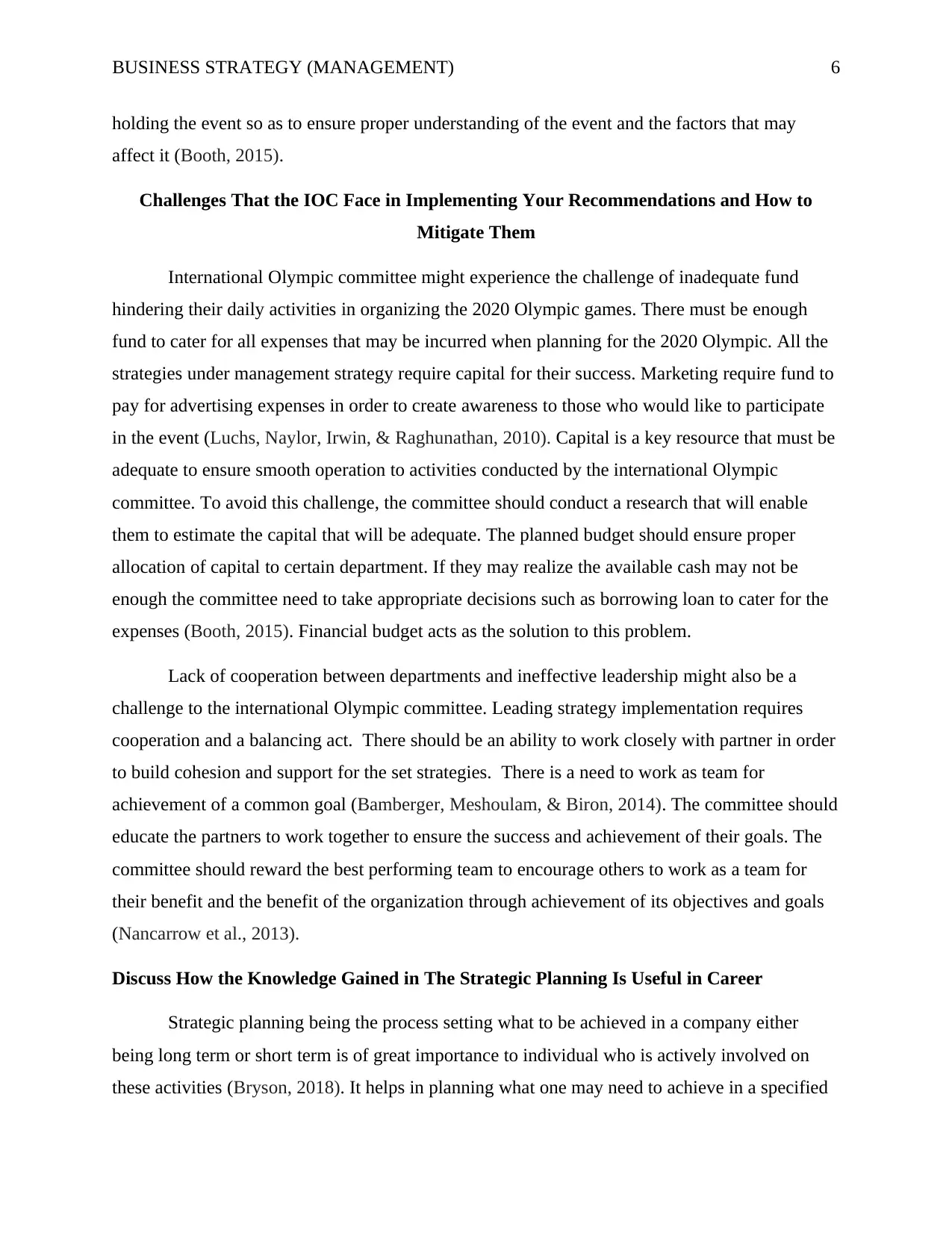
BUSINESS STRATEGY (MANAGEMENT) 6
holding the event so as to ensure proper understanding of the event and the factors that may
affect it (Booth, 2015).
Challenges That the IOC Face in Implementing Your Recommendations and How to
Mitigate Them
International Olympic committee might experience the challenge of inadequate fund
hindering their daily activities in organizing the 2020 Olympic games. There must be enough
fund to cater for all expenses that may be incurred when planning for the 2020 Olympic. All the
strategies under management strategy require capital for their success. Marketing require fund to
pay for advertising expenses in order to create awareness to those who would like to participate
in the event (Luchs, Naylor, Irwin, & Raghunathan, 2010). Capital is a key resource that must be
adequate to ensure smooth operation to activities conducted by the international Olympic
committee. To avoid this challenge, the committee should conduct a research that will enable
them to estimate the capital that will be adequate. The planned budget should ensure proper
allocation of capital to certain department. If they may realize the available cash may not be
enough the committee need to take appropriate decisions such as borrowing loan to cater for the
expenses (Booth, 2015). Financial budget acts as the solution to this problem.
Lack of cooperation between departments and ineffective leadership might also be a
challenge to the international Olympic committee. Leading strategy implementation requires
cooperation and a balancing act. There should be an ability to work closely with partner in order
to build cohesion and support for the set strategies. There is a need to work as team for
achievement of a common goal (Bamberger, Meshoulam, & Biron, 2014). The committee should
educate the partners to work together to ensure the success and achievement of their goals. The
committee should reward the best performing team to encourage others to work as a team for
their benefit and the benefit of the organization through achievement of its objectives and goals
(Nancarrow et al., 2013).
Discuss How the Knowledge Gained in The Strategic Planning Is Useful in Career
Strategic planning being the process setting what to be achieved in a company either
being long term or short term is of great importance to individual who is actively involved on
these activities (Bryson, 2018). It helps in planning what one may need to achieve in a specified
holding the event so as to ensure proper understanding of the event and the factors that may
affect it (Booth, 2015).
Challenges That the IOC Face in Implementing Your Recommendations and How to
Mitigate Them
International Olympic committee might experience the challenge of inadequate fund
hindering their daily activities in organizing the 2020 Olympic games. There must be enough
fund to cater for all expenses that may be incurred when planning for the 2020 Olympic. All the
strategies under management strategy require capital for their success. Marketing require fund to
pay for advertising expenses in order to create awareness to those who would like to participate
in the event (Luchs, Naylor, Irwin, & Raghunathan, 2010). Capital is a key resource that must be
adequate to ensure smooth operation to activities conducted by the international Olympic
committee. To avoid this challenge, the committee should conduct a research that will enable
them to estimate the capital that will be adequate. The planned budget should ensure proper
allocation of capital to certain department. If they may realize the available cash may not be
enough the committee need to take appropriate decisions such as borrowing loan to cater for the
expenses (Booth, 2015). Financial budget acts as the solution to this problem.
Lack of cooperation between departments and ineffective leadership might also be a
challenge to the international Olympic committee. Leading strategy implementation requires
cooperation and a balancing act. There should be an ability to work closely with partner in order
to build cohesion and support for the set strategies. There is a need to work as team for
achievement of a common goal (Bamberger, Meshoulam, & Biron, 2014). The committee should
educate the partners to work together to ensure the success and achievement of their goals. The
committee should reward the best performing team to encourage others to work as a team for
their benefit and the benefit of the organization through achievement of its objectives and goals
(Nancarrow et al., 2013).
Discuss How the Knowledge Gained in The Strategic Planning Is Useful in Career
Strategic planning being the process setting what to be achieved in a company either
being long term or short term is of great importance to individual who is actively involved on
these activities (Bryson, 2018). It helps in planning what one may need to achieve in a specified
⊘ This is a preview!⊘
Do you want full access?
Subscribe today to unlock all pages.

Trusted by 1+ million students worldwide
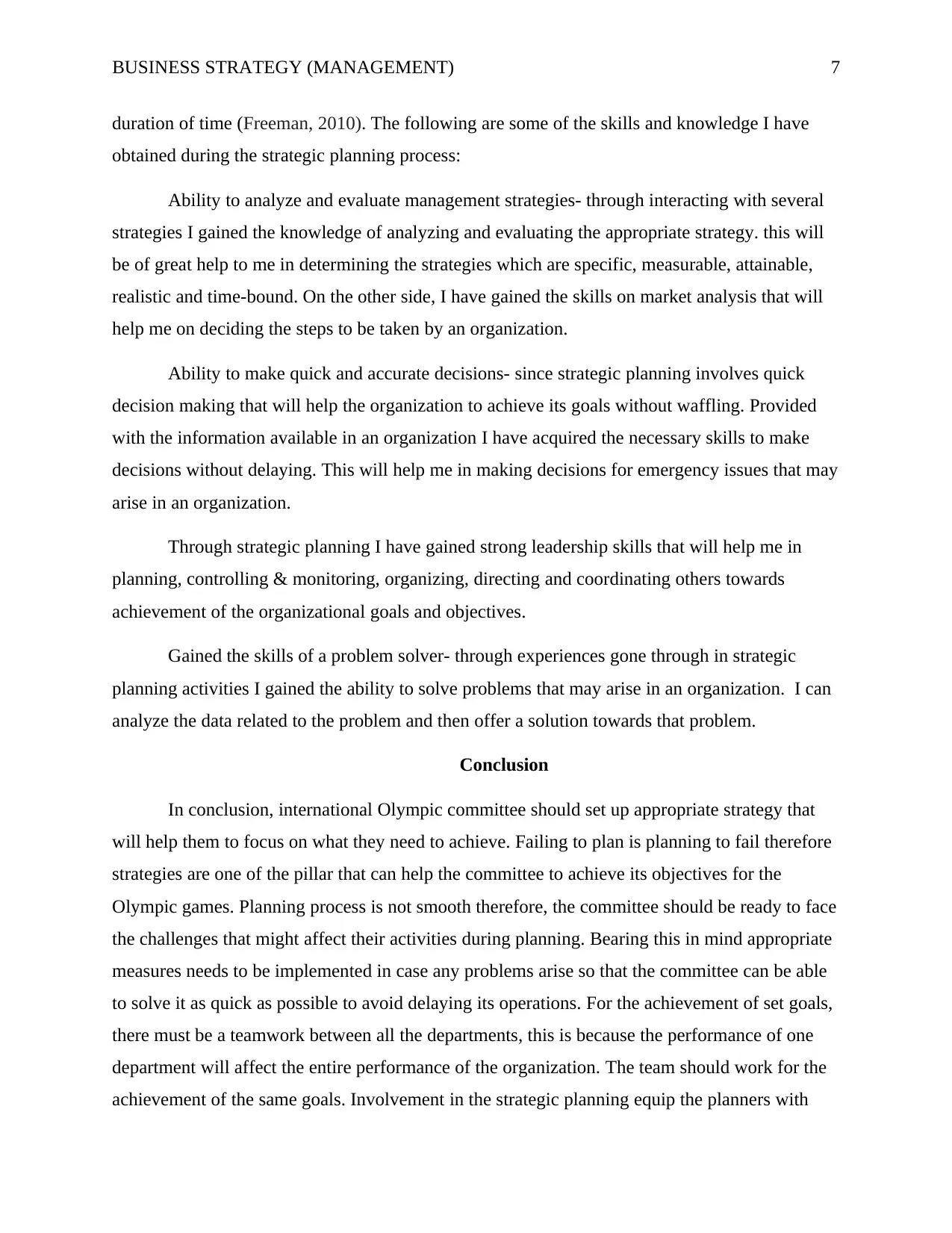
BUSINESS STRATEGY (MANAGEMENT) 7
duration of time (Freeman, 2010). The following are some of the skills and knowledge I have
obtained during the strategic planning process:
Ability to analyze and evaluate management strategies- through interacting with several
strategies I gained the knowledge of analyzing and evaluating the appropriate strategy. this will
be of great help to me in determining the strategies which are specific, measurable, attainable,
realistic and time-bound. On the other side, I have gained the skills on market analysis that will
help me on deciding the steps to be taken by an organization.
Ability to make quick and accurate decisions- since strategic planning involves quick
decision making that will help the organization to achieve its goals without waffling. Provided
with the information available in an organization I have acquired the necessary skills to make
decisions without delaying. This will help me in making decisions for emergency issues that may
arise in an organization.
Through strategic planning I have gained strong leadership skills that will help me in
planning, controlling & monitoring, organizing, directing and coordinating others towards
achievement of the organizational goals and objectives.
Gained the skills of a problem solver- through experiences gone through in strategic
planning activities I gained the ability to solve problems that may arise in an organization. I can
analyze the data related to the problem and then offer a solution towards that problem.
Conclusion
In conclusion, international Olympic committee should set up appropriate strategy that
will help them to focus on what they need to achieve. Failing to plan is planning to fail therefore
strategies are one of the pillar that can help the committee to achieve its objectives for the
Olympic games. Planning process is not smooth therefore, the committee should be ready to face
the challenges that might affect their activities during planning. Bearing this in mind appropriate
measures needs to be implemented in case any problems arise so that the committee can be able
to solve it as quick as possible to avoid delaying its operations. For the achievement of set goals,
there must be a teamwork between all the departments, this is because the performance of one
department will affect the entire performance of the organization. The team should work for the
achievement of the same goals. Involvement in the strategic planning equip the planners with
duration of time (Freeman, 2010). The following are some of the skills and knowledge I have
obtained during the strategic planning process:
Ability to analyze and evaluate management strategies- through interacting with several
strategies I gained the knowledge of analyzing and evaluating the appropriate strategy. this will
be of great help to me in determining the strategies which are specific, measurable, attainable,
realistic and time-bound. On the other side, I have gained the skills on market analysis that will
help me on deciding the steps to be taken by an organization.
Ability to make quick and accurate decisions- since strategic planning involves quick
decision making that will help the organization to achieve its goals without waffling. Provided
with the information available in an organization I have acquired the necessary skills to make
decisions without delaying. This will help me in making decisions for emergency issues that may
arise in an organization.
Through strategic planning I have gained strong leadership skills that will help me in
planning, controlling & monitoring, organizing, directing and coordinating others towards
achievement of the organizational goals and objectives.
Gained the skills of a problem solver- through experiences gone through in strategic
planning activities I gained the ability to solve problems that may arise in an organization. I can
analyze the data related to the problem and then offer a solution towards that problem.
Conclusion
In conclusion, international Olympic committee should set up appropriate strategy that
will help them to focus on what they need to achieve. Failing to plan is planning to fail therefore
strategies are one of the pillar that can help the committee to achieve its objectives for the
Olympic games. Planning process is not smooth therefore, the committee should be ready to face
the challenges that might affect their activities during planning. Bearing this in mind appropriate
measures needs to be implemented in case any problems arise so that the committee can be able
to solve it as quick as possible to avoid delaying its operations. For the achievement of set goals,
there must be a teamwork between all the departments, this is because the performance of one
department will affect the entire performance of the organization. The team should work for the
achievement of the same goals. Involvement in the strategic planning equip the planners with
Paraphrase This Document
Need a fresh take? Get an instant paraphrase of this document with our AI Paraphraser
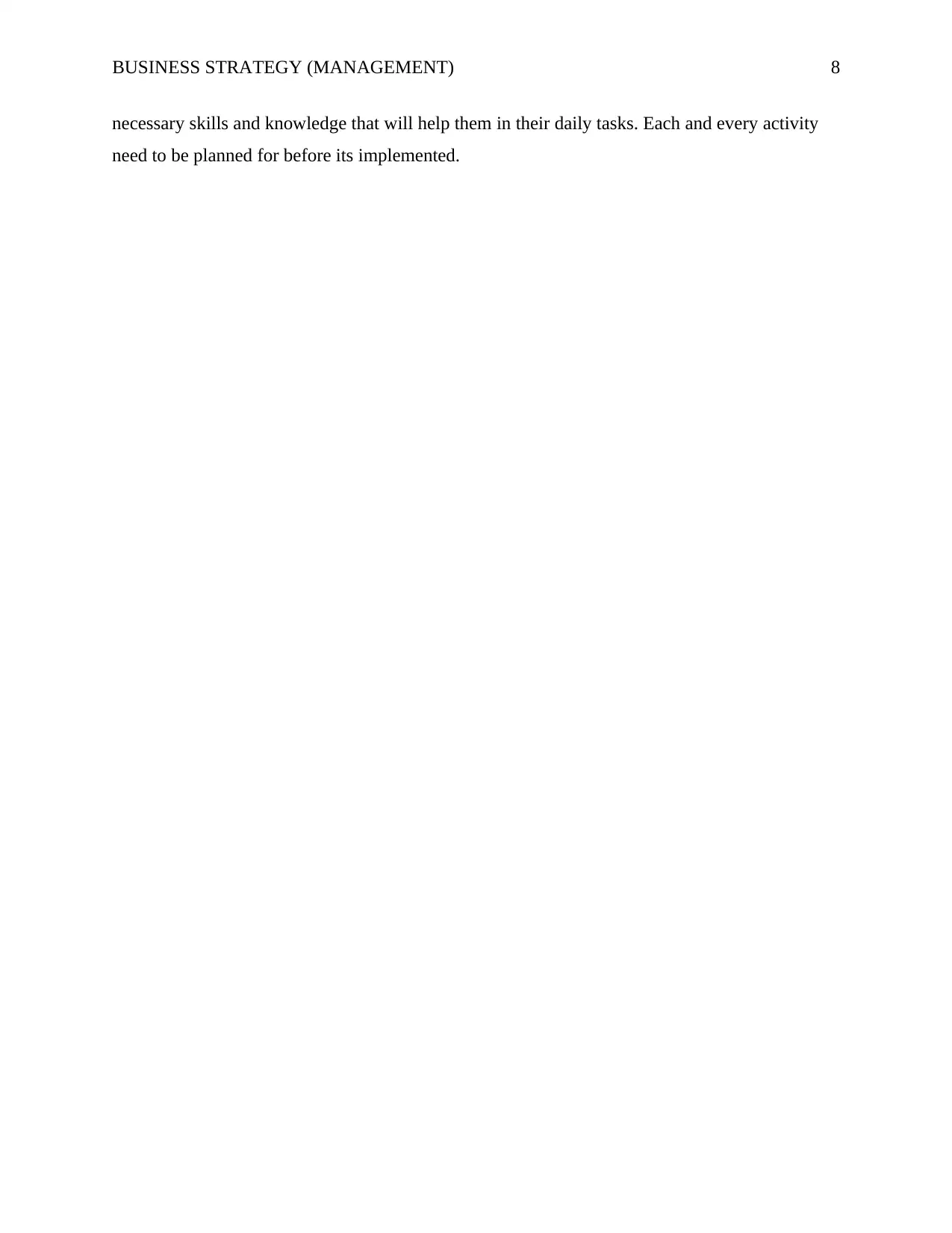
BUSINESS STRATEGY (MANAGEMENT) 8
necessary skills and knowledge that will help them in their daily tasks. Each and every activity
need to be planned for before its implemented.
necessary skills and knowledge that will help them in their daily tasks. Each and every activity
need to be planned for before its implemented.
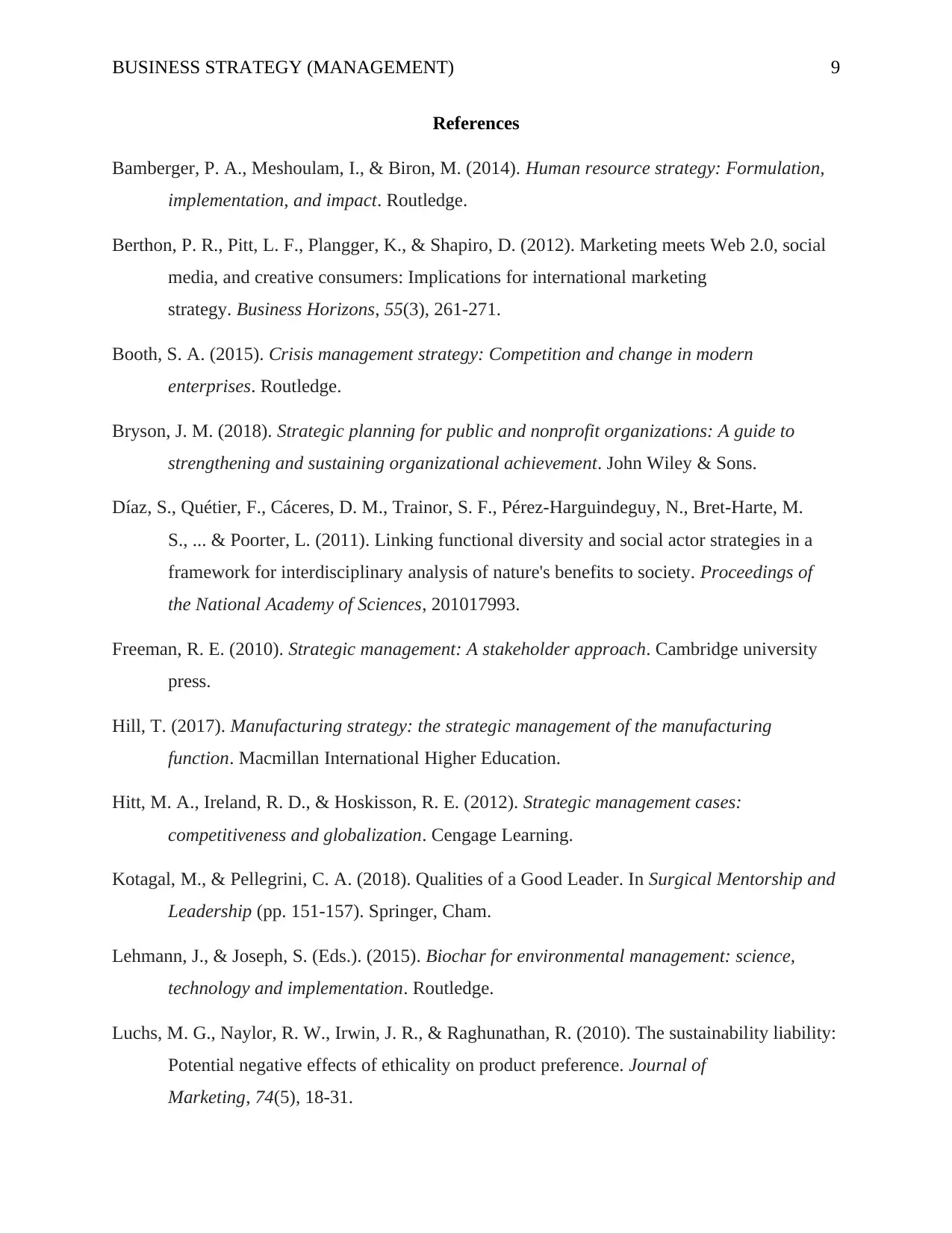
BUSINESS STRATEGY (MANAGEMENT) 9
References
Bamberger, P. A., Meshoulam, I., & Biron, M. (2014). Human resource strategy: Formulation,
implementation, and impact. Routledge.
Berthon, P. R., Pitt, L. F., Plangger, K., & Shapiro, D. (2012). Marketing meets Web 2.0, social
media, and creative consumers: Implications for international marketing
strategy. Business Horizons, 55(3), 261-271.
Booth, S. A. (2015). Crisis management strategy: Competition and change in modern
enterprises. Routledge.
Bryson, J. M. (2018). Strategic planning for public and nonprofit organizations: A guide to
strengthening and sustaining organizational achievement. John Wiley & Sons.
Díaz, S., Quétier, F., Cáceres, D. M., Trainor, S. F., Pérez-Harguindeguy, N., Bret-Harte, M.
S., ... & Poorter, L. (2011). Linking functional diversity and social actor strategies in a
framework for interdisciplinary analysis of nature's benefits to society. Proceedings of
the National Academy of Sciences, 201017993.
Freeman, R. E. (2010). Strategic management: A stakeholder approach. Cambridge university
press.
Hill, T. (2017). Manufacturing strategy: the strategic management of the manufacturing
function. Macmillan International Higher Education.
Hitt, M. A., Ireland, R. D., & Hoskisson, R. E. (2012). Strategic management cases:
competitiveness and globalization. Cengage Learning.
Kotagal, M., & Pellegrini, C. A. (2018). Qualities of a Good Leader. In Surgical Mentorship and
Leadership (pp. 151-157). Springer, Cham.
Lehmann, J., & Joseph, S. (Eds.). (2015). Biochar for environmental management: science,
technology and implementation. Routledge.
Luchs, M. G., Naylor, R. W., Irwin, J. R., & Raghunathan, R. (2010). The sustainability liability:
Potential negative effects of ethicality on product preference. Journal of
Marketing, 74(5), 18-31.
References
Bamberger, P. A., Meshoulam, I., & Biron, M. (2014). Human resource strategy: Formulation,
implementation, and impact. Routledge.
Berthon, P. R., Pitt, L. F., Plangger, K., & Shapiro, D. (2012). Marketing meets Web 2.0, social
media, and creative consumers: Implications for international marketing
strategy. Business Horizons, 55(3), 261-271.
Booth, S. A. (2015). Crisis management strategy: Competition and change in modern
enterprises. Routledge.
Bryson, J. M. (2018). Strategic planning for public and nonprofit organizations: A guide to
strengthening and sustaining organizational achievement. John Wiley & Sons.
Díaz, S., Quétier, F., Cáceres, D. M., Trainor, S. F., Pérez-Harguindeguy, N., Bret-Harte, M.
S., ... & Poorter, L. (2011). Linking functional diversity and social actor strategies in a
framework for interdisciplinary analysis of nature's benefits to society. Proceedings of
the National Academy of Sciences, 201017993.
Freeman, R. E. (2010). Strategic management: A stakeholder approach. Cambridge university
press.
Hill, T. (2017). Manufacturing strategy: the strategic management of the manufacturing
function. Macmillan International Higher Education.
Hitt, M. A., Ireland, R. D., & Hoskisson, R. E. (2012). Strategic management cases:
competitiveness and globalization. Cengage Learning.
Kotagal, M., & Pellegrini, C. A. (2018). Qualities of a Good Leader. In Surgical Mentorship and
Leadership (pp. 151-157). Springer, Cham.
Lehmann, J., & Joseph, S. (Eds.). (2015). Biochar for environmental management: science,
technology and implementation. Routledge.
Luchs, M. G., Naylor, R. W., Irwin, J. R., & Raghunathan, R. (2010). The sustainability liability:
Potential negative effects of ethicality on product preference. Journal of
Marketing, 74(5), 18-31.
⊘ This is a preview!⊘
Do you want full access?
Subscribe today to unlock all pages.

Trusted by 1+ million students worldwide
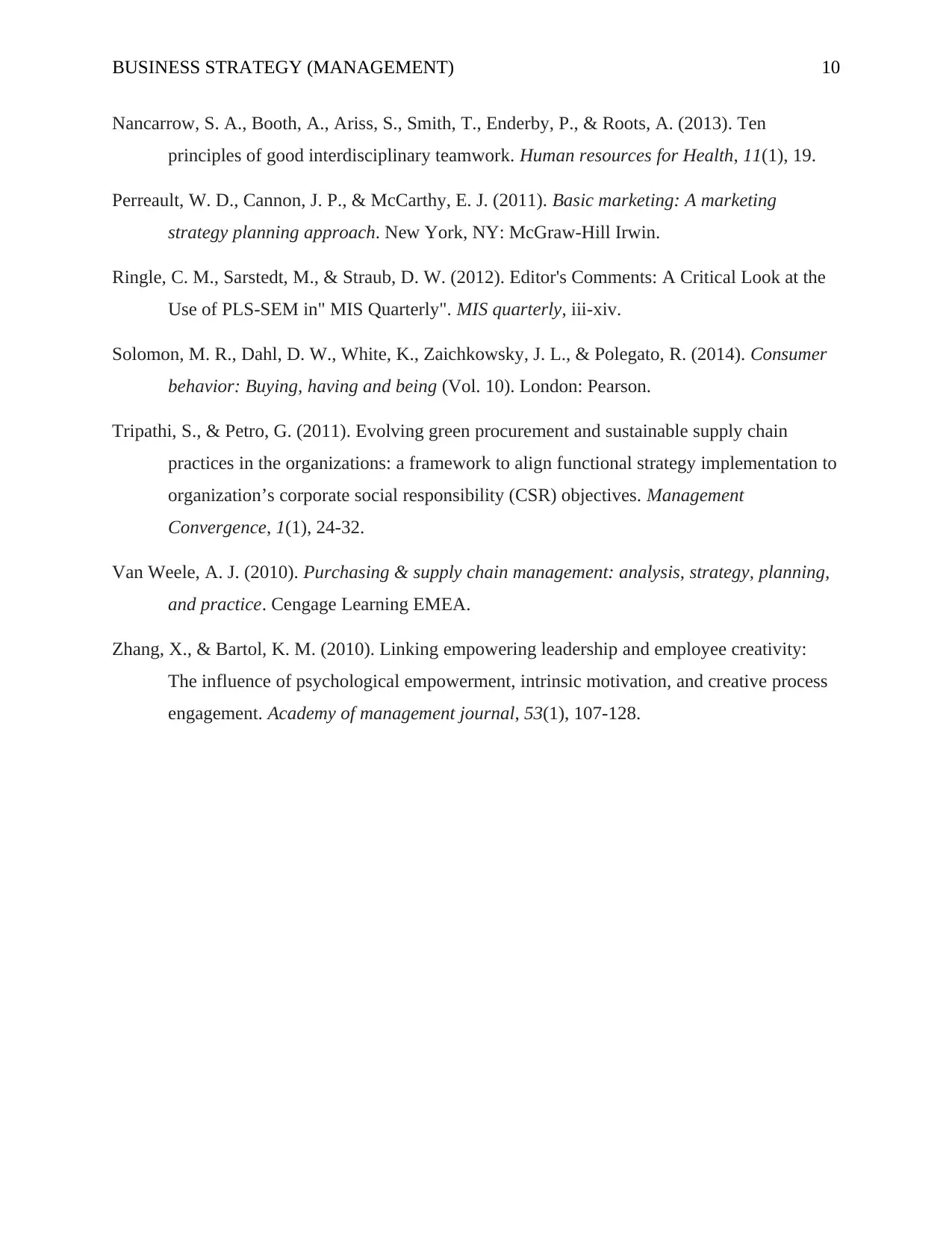
BUSINESS STRATEGY (MANAGEMENT) 10
Nancarrow, S. A., Booth, A., Ariss, S., Smith, T., Enderby, P., & Roots, A. (2013). Ten
principles of good interdisciplinary teamwork. Human resources for Health, 11(1), 19.
Perreault, W. D., Cannon, J. P., & McCarthy, E. J. (2011). Basic marketing: A marketing
strategy planning approach. New York, NY: McGraw-Hill Irwin.
Ringle, C. M., Sarstedt, M., & Straub, D. W. (2012). Editor's Comments: A Critical Look at the
Use of PLS-SEM in" MIS Quarterly". MIS quarterly, iii-xiv.
Solomon, M. R., Dahl, D. W., White, K., Zaichkowsky, J. L., & Polegato, R. (2014). Consumer
behavior: Buying, having and being (Vol. 10). London: Pearson.
Tripathi, S., & Petro, G. (2011). Evolving green procurement and sustainable supply chain
practices in the organizations: a framework to align functional strategy implementation to
organization’s corporate social responsibility (CSR) objectives. Management
Convergence, 1(1), 24-32.
Van Weele, A. J. (2010). Purchasing & supply chain management: analysis, strategy, planning,
and practice. Cengage Learning EMEA.
Zhang, X., & Bartol, K. M. (2010). Linking empowering leadership and employee creativity:
The influence of psychological empowerment, intrinsic motivation, and creative process
engagement. Academy of management journal, 53(1), 107-128.
Nancarrow, S. A., Booth, A., Ariss, S., Smith, T., Enderby, P., & Roots, A. (2013). Ten
principles of good interdisciplinary teamwork. Human resources for Health, 11(1), 19.
Perreault, W. D., Cannon, J. P., & McCarthy, E. J. (2011). Basic marketing: A marketing
strategy planning approach. New York, NY: McGraw-Hill Irwin.
Ringle, C. M., Sarstedt, M., & Straub, D. W. (2012). Editor's Comments: A Critical Look at the
Use of PLS-SEM in" MIS Quarterly". MIS quarterly, iii-xiv.
Solomon, M. R., Dahl, D. W., White, K., Zaichkowsky, J. L., & Polegato, R. (2014). Consumer
behavior: Buying, having and being (Vol. 10). London: Pearson.
Tripathi, S., & Petro, G. (2011). Evolving green procurement and sustainable supply chain
practices in the organizations: a framework to align functional strategy implementation to
organization’s corporate social responsibility (CSR) objectives. Management
Convergence, 1(1), 24-32.
Van Weele, A. J. (2010). Purchasing & supply chain management: analysis, strategy, planning,
and practice. Cengage Learning EMEA.
Zhang, X., & Bartol, K. M. (2010). Linking empowering leadership and employee creativity:
The influence of psychological empowerment, intrinsic motivation, and creative process
engagement. Academy of management journal, 53(1), 107-128.
1 out of 10
Related Documents
Your All-in-One AI-Powered Toolkit for Academic Success.
+13062052269
info@desklib.com
Available 24*7 on WhatsApp / Email
![[object Object]](/_next/static/media/star-bottom.7253800d.svg)
Unlock your academic potential
Copyright © 2020–2026 A2Z Services. All Rights Reserved. Developed and managed by ZUCOL.





